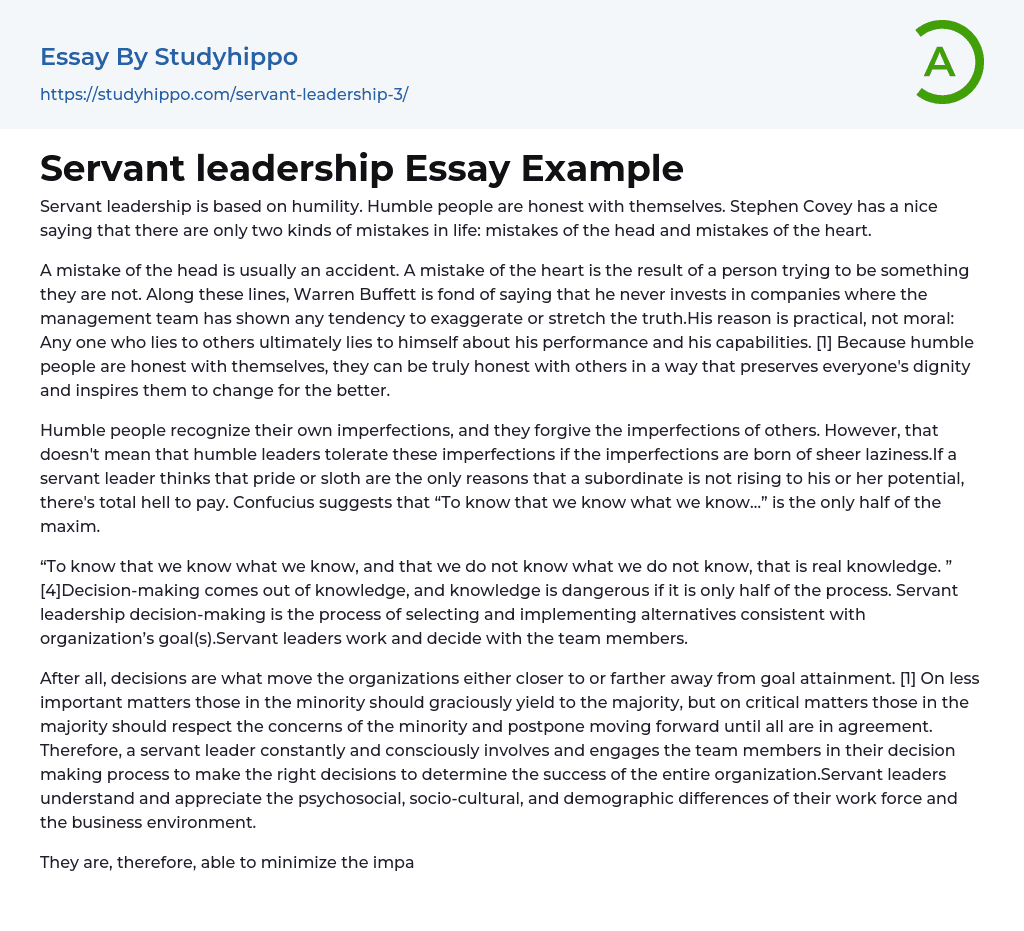Servant leadership is based on humility. Humble people are honest with themselves. Stephen Covey has a nice saying that there are only two kinds of mistakes in life: mistakes of the head and mistakes of the heart.
A mistake of the head is usually an accident. A mistake of the heart is the result of a person trying to be something they are not. Along these lines, Warren Buffett is fond of saying that he never invests in companies where the management team has shown any tendency to exaggerate or stretch the truth.His reason is practical, not moral: Any one who lies to others ultimately lies to himself about his performance and his capabilities. [1] Because humble people are honest with themselves, they can be truly honest with others in a way that preserves everyone's dignity and inspires them to change
...for the better.
Humble people recognize their own imperfections, and they forgive the imperfections of others. However, that doesn't mean that humble leaders tolerate these imperfections if the imperfections are born of sheer laziness.If a servant leader thinks that pride or sloth are the only reasons that a subordinate is not rising to his or her potential, there's total hell to pay. Confucius suggests that “To know that we know what we know…” is the only half of the maxim.
“To know that we know what we know, and that we do not know what we do not know, that is real knowledge. ” [4]Decision-making comes out of knowledge, and knowledge is dangerous if it is only half of the process. Servant leadership decision-making is the process of selecting and implementing alternatives consistent wit
organization’s goal(s).Servant leaders work and decide with the team members.
After all, decisions are what move the organizations either closer to or farther away from goal attainment. [1] On less important matters those in the minority should graciously yield to the majority, but on critical matters those in the majority should respect the concerns of the minority and postpone moving forward until all are in agreement. Therefore, a servant leader constantly and consciously involves and engages the team members in their decision making process to make the right decisions to determine the success of the entire organization.Servant leaders understand and appreciate the psychosocial, socio-cultural, and demographic differences of their work force and the business environment.
They are, therefore, able to minimize the impact of autocracy in their decision-making strategies. The best test of decision making, and challenging to apply, is: do those served grow as persons; do they, while being served, become healthier, wiser, freer, more autonomous, more likely themselves to become servants?And what is the effect on the least privileged society; will they benefit from the made decision, or at least will they not be further isolated” [6] Servant-Leadership involves helping people grow as individuals, helping them to become wiser, healthier, freer, more autonomous—more likely themselves to become servant-leaders. It benefits the least privileged in society so that they will not be further deprived.Bibliography:[1] Harold C. Babson.
Business Policy and Strategy: An Action Guide, Sixth Edition.24 Aug. 2004 ;. http://www. greenleaf. org/leadership/servant-leadership/What-is-Servant-Leadership.
html; [2] Bergdahl. The 10 Rules of Sam Walton: Success Secrets for Remarkable Results. New York:John Wiley, 2006 [3] Sam Walton. Sam Walton:Made in America. New York: Basic Books, 2000 [4] Yoav
Vard.
Misbehavior in Organizations: Theory, Research, and Management (Applied Psychology Series) . London :Macmillan, 1998 [5] Ian Palmer . Thinking about Management: Implications of Organizational Debates for Practice
- Values of Life essays
- Ethical dilemma essays
- Normative Ethics essays
- Virtue Ethics essays
- Belief essays
- Deontology essays
- Moral essays
- Virtue essays
- Work Ethic essays
- Being A Leader essays
- Servant Leadership essays
- Leadership Experience essays
- Leadership Qualities essays
- Acceptance essays
- Age Of Enlightenment essays
- Child Observation essays
- Confucianism essays
- Conscience essays
- Critical Reflection essays
- Destiny essays
- Determinism essays
- Empiricism essays
- Environmentalism essays
- Epistemology essays
- Ethics essays
- Ethos essays
- Existence essays
- Existentialism essays
- Fate essays
- Free Will essays
- Functionalism essays
- Future essays
- Good And Evil essays
- Human Nature essays
- Individualism essays
- Meaning Of Life essays
- Metaphysics essays
- Natural Law essays
- Personal Philosophy essays
- Philosophers essays
- Philosophy Of Life essays
- Political Philosophy essays
- Pragmatism essays
- Reality essays
- Relativism essays
- Teaching Philosophy essays
- Time essays
- Transcendentalism essays
- Truth essays
- Utilitarianism essays




